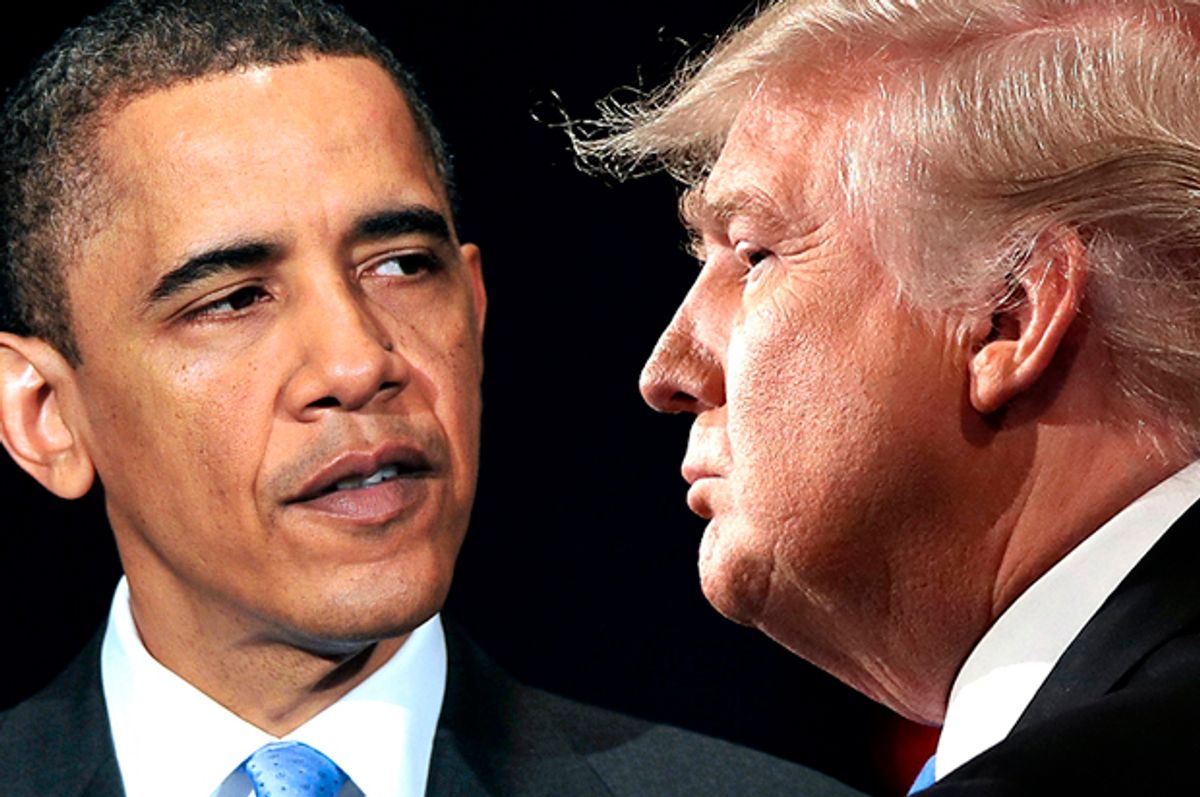Global public opinion of President Trump and the United States has plummeted in 2017—and that was before Trump lectured global leaders at the United Nations Monday, saying the UN was a bloated and ineffective bureaucracy and suggesting American financial and military support was not a given.
“In recent years, the United Nations has not reached its full potential because of bureaucracy and mismanagement,” Trump said at a forum on "reforming" the UN. “To honor the people of our nations, we must ensure that no one and no member state shoulders a disproportionate share of the burden, and that’s militarily or financially.”
However, when it comes to being ineffective and mismanaging leadership, global public opinion has shown both confidence in Trump and favorable views of the United States have bottomed out to levels not seen since President George W. Bush launched a war of choice in Iraq—although confidence in Trump has taken the biggest hit.
“Since Trump took office, confidence in the president has gone down further, on average, than favorability toward the U.S.: Confidence dropped 47 points; U.S. favorability just 13 points,” wrote Gus Werezek and Andrea Jones-Rooy, at FiveThirtyEight.com, in a piece that parsed the findings in annual surveys of global opinion by the Pew Research Center. Each year, Pew surveys roughly 1,000 people in five to 40 counties.
Only two countries had improved views of President Trump compared to his predecessor: Russia and Israel. Only two nations had relatively unchanged views of U.S. favorability: Israel and Poland. Not surprisingly, the countries with the sharpest declines in confidence in the president and in American government are those that are our closest allies.
“Some of the biggest declines have been in countries with whom the U.S. has a collective defense agreement, such as NATO members and Japan, especially when it comes to confidence in the president,” FiveThirtyEight.com said. “Mexico, unsurprisingly, also saw a big public opinion drop on both questions. On the other hand, public favorability toward the U.S. has gone up in Russia, and public confidence in the president has gone up in both Israel and Russia since Trump took office.”
Two years before Trump took office, approximately 65 percent of the thousands of foreigners polled by Pew had a favorable view of the U.S. That average is now 50 percent. In 2015 and 2016, the global public opinion’s confidence in President Obama was 63 percent and 73 percent, respectively. For Trump, that average is 27 percent.
Some of the biggest drops in foreign public confidence in Trump come from global hotspots, starting with South Korea—near the North Korean dictator who keeps testing missiles and nuclear weapons. In 2015, 88 percent of South Koreans had confidence in the U.S. president. Today, that figure is 17 percent. Other major allies that have little confidence in Trump include Germany (11 percent) and Mexico (5 percent).
These levels essentially have erased the goodwill that the Obama administration built up after George W. Bush’s invasion of Iraq.
“Overall, though, Trump has brought a return to George W. Bush-era levels of favorability for the U.S. and the presidency,” wrote FiveThirtyEight.com.
Pew’s research asked foreigners between March and June 2017 about five specific Trump policies: withdrawing from international climate change agreements; building a wall between the U.S. and Mexico; withdrawing from the nuclear weapons agreement with Iran; withdrawing from major trade agreements; and restricting travel from some majority Muslim countries.
On climate change, a majority in only one country, Indonesia, approved of Trump’s actions. On building a Mexican border wall, the most-approving three countries were Israel, Indonesia and Russia. On withdrawing from the Iranian nuclear deal, only a majority in Turkey supported Trump. No country supported withdrawing from trade agreements. But Russia, Israel and South Korea supported the Muslim travel ban.
“Foreign publics generally do not approve of any of the five policies, but the idea of withdrawing the U.S. from the Iran agreement drew the least approval, at an average global net approval of -15.7 percent,” FiveThirtyEight.com said. “Trump’s plan to build a wall between the U.S. and Mexico and to withdraw from major trade agreements were almost universally disliked (average net approval of -50.5 and -49.7 percent, respectively)."
Trump’s brief comments at the UN on Monday—he spoke for four minutes—did not directly mention any of these issues. The closest was deriding its peacekeeping missions, where he said, “We also ask that every peacekeeping mission have clearly defined goals and metrics for evaluating success.”
One can speculate about what Trump’s audience of foreign leaders thought of his remarks. But if they are at all similar to their countries' citizens, most of the world sees Trump for what he is and they are not impressed.


Shares